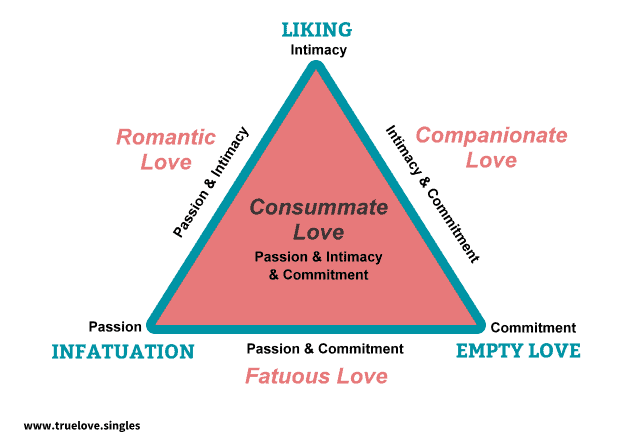Understanding the elements of love and the way they may come together in one’s life can give singles greater insight into their dating efforts. These insights help singles to better decide if a promising relationship with another has long-term potential.
Prominent psychologist and author Robert J. Sternberg developed the explanatory Triangular Theory of Love, as illustrated in the following graphic.

Sternberg’s explanation aptly references the various elements of love commonly found in interpersonal relationships: Passion, Intimacy, and Commitment, as well as their various permutations giving rise to Romantic Love, Fatuous Love, Companionate Love, and eventually Consummate Love.
Passion involves feelings and desires that lead to physical attraction, romance, and sexual consummation.
Intimacy involves feelings and situations of closeness, connectedness, and bondedness.
Commitment involves feelings that lead a person to remain with someone and move toward shared goals.

Liking, in this case, is not used in a trivial sense. This intimate liking characterizes true friendships, in which a person feels a bondedness, a warmth, and a closeness with another but not intense passion or long-term commitment.
Infatuation is often what is felt as “love at first sight.” But without the intimacy and the commitment components of love arising, infatuated love will fade sooner than later.
Empty love emerges when a real love deteriorates but a commitment remains. Intimacy and passion have faded. In arranged marriages, conjugal relationships often begin as nearly empty love.

Romantic love (Passion & Intimacy) bonds two lovers emotionally via attraction and physically through erotic desire. Passions lead to intimacy, and love is wished to last forever.
Fatuous love (Passion & Commitment) or unrequited love is when a commitment is motivated largely by passion by one, without being reciprocated by the other let intimacy arise.
Companionate love (Intimacy & Commitment) is often found in marriages in which the passion has gone out of the relationship, but a deep affection and commitment remain.

Consummate love is the complete form of love, representing the ideal relationship toward which many people strive but which apparently few achieve. Sternberg cautions that maintaining a consummate love may be even harder than achieving it. He stresses the importance of translating the components of love into action. “Without expression,” he warns, “even the greatest of loves can die.”
Consummate love may not be permanent. For example, if passion is lost over time, it may change into companionate love. However, I wish to add that if consummate love does outlast the ups and downs of a shared life, that love may then be called true love – and only then. That is, personal passions can last as affections – in spite of a person’s naturally declining sexuality.

Consider how these loves can play out in relationship dynamics and see if you can recognize yourself or anyone you know in any of them.
Recognize Yourself?

A young single said: “Ah, that is what it is then? My parents and church elders should know, really, but they don’t. Way to go…”
A matchmaker said: “Do I have time to study all this? My gut feelings have served me well until now – and singles cherish my esteemed opinions. Why bother?”
A younger couple said: “We are intimate now, but fear that it may only last until our children have grown up.”
Two Gen Xers said: “We like each other and make good friends. But sharing a bed together?”
A female said: “I fell for a jerk, believing him when he said he was in love with me. I was, but he never knew what commitment is.”
An abstinent young male said: “I cannot predict what my cravings, my appetites will be over the years to come. Will she accept my passions − me − just as they may arise later?”
A marriage counselor said: “I hope that this new website, truelove.singles, is getting read. An ounce of prevention is better than a pound of cure.”

Who Cares?
The above is just that: a basic, static, and normative conceptualization void of temporality. In real life, pair-bonded relationships and their loves are dynamic and fluid in nature. Love, of all things, does not delight or disappoint according to a chart.
Romantic love, for once, is surely different for a younger couple than for an older one.
There is no good answer as to where some love ends and another begins.
And there is always a gap between how one wishes things were and how they really are.
Moreover, the Western conception of love will probably make little sense to a person like Fatima, a 47-year-old mother of 7 children and wife #3 of a Taliban tribal leader.
Any person might also wonder how a deity like a Judeo-Christian God fits into all of this. Good question, no quick answer here.
Compared to intimacy (love as caring) and especially commitment (love as transcendence), it can probably be said that desire, passion, or amorous love play the least role in most religion-anchored pair-bonds (marriages).
Some say that marriage is a sanctioned fabrication, a straightjacket sort of, to keep carnal passions and their consequences under wraps. Others have said that one can only go to Heaven as a couple bonded in God’s love.
However, it is the children who one must believe as entitled to benefit from the lasting intimacy of an original parental pair-bond.